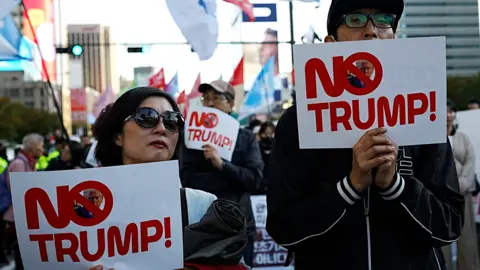Navigating Tensions: South Korea's Balancing Act Between US and China
As South Korea prepares to host rival superpowers Donald Trump and Xi Jinping, citizens express their concerns through protests, highlighting the country's challenging diplomatic position between the two nations.

On the busy streets of Seoul, hundreds rallied against Trump, shouting No Trump! loud enough to reach the gates of the United States embassy. Simultaneously, another group protested against China, chanting No China near Gyeongbokgung palace. These protests, though not extensive by South Korean standards, reflect the tension surrounding the upcoming meetings of the two leaders on Asian soil.
South Korea, a key US ally since the Korean War, faces a complex situation. President Lee Jae-myung is tasked with navigating the delicate balance between maintaining strong ties with the US while also accommodating its largest trading partner, China.
“It’s a particularly fraught moment — South Korea finds itself caught between a rock and a hard place,” stated Darcie Draudt-Vejares from the Carnegie Endowment for International Peace. This sentiment was echoed by many protesters who expressed frustration over the perceived heavy-handedness of both nations.
Lee follows a complicated tenure marked by his predecessor's controversial policies, yet attempts to strengthen relations with the US through significant investments have been met with a chilling response following immigration issues linked to South Korean nationals in the US. Trump’s insistence on greater cash investments as part of their trade negotiations has left South Koreans questioning their status as an equal partner.
Amidst these challenges, Lee seeks to avoid alienating either superpower while bolstering security and economic stability for South Korea. Observers note that the upcoming dialogues with Xi provide Lee a chance to reclaim some diplomatic ground after Yoon's administration suffered from hawkish interactions with China.
Looking ahead, Lee's ability to successfully maneuver through these geopolitical currents could redefine South Korea's role on the international stage and test the limits of its long-standing alliances.


















